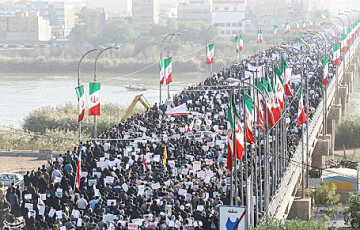Will Israel Be Able To Cause Regime Change In Iran?
- Alexandra Appelberg
- 15.06.2025, 14:42
- 5,546

Israel is not hitting technology, but power structures.
In the international debate on Iran in recent decades, two camps have clearly emerged. Some saw the main threat in the possibility of Iran possessing nuclear weapons, but believed that a deal could be struck with it: giving up weapons in exchange for the lifting of sanctions and a return to the world community. For others, the regime itself is a source of instability, and no agreement will change it. For them, the nuclear program is just a pretext for maintaining pressure and sanctions in hopes of bringing down the Islamic Republic.
Binyamin Netanyahu has made no secret of his affiliation with the second camp, and reiterated it last Friday when he said he hoped the operation would "clear the way" for the Iranian people "to achieve your freedom."
Although the Israeli strikes have targeted nuclear facilities among others, even within Israel itself recognizes that this is not enough to destroy uranium enrichment capabilities entirely.
Other targets shed light on Netanyahu's true intentions. Israel is not striking at technology, but at power structures. The strikes hit military headquarters, residences and individuals.
Even if Israel does not aim to return to the days of the Shah, when Iran was an ally of the US and Israel, the choice of targets - high-ranking officers and veterans of the Islamic Revolutionary Guard Corps (IRGC), rather than exclusively nuclear facilities - indicates an intention to strike at the core of the ruling regime. Among those killed are the oldest figures involved in the formation of the Iranian revolution, veterans of the Iran-Iraq war, and key players in the nuclear program.
Ayatollah Khamenei himself (who is still alive) also belongs to the generation of activists who came to power immediately after the 1979 revolution. The defeat of this generation symbolizes an attempt to cut the historical and ideological thread that has held the current regime together for more than four decades. Netanyahu virtually recognized this, saying, "We are fighting a brutal dictatorship that has oppressed you for 46 years."
Are these plans realistic? Of course, the Islamic Republic is weaker than ever, and growing weaker with each new wave of Israeli attacks. If Israel succeeds in toppling the Islamic regime in Tehran, the blow, in Netanyahu's view, will be worth it, despite the destruction and even loss of life in Israel.
But history tells us that toppling a regime with airstrikes usually fails. Muammar Gaddafi in 1986, Saddam Hussein in Iraq in 1991 and Slobodan Milosevic in 1999 all stayed in power and only radicalized.
With regard to the nuclear program, Israel acknowledges that Iran will still have the capability. And while so far Iranian leaders have not made a decision to build a nuclear bomb, using their border status to strengthen their negotiating position (as is now evidently unsuccessful), the balance of power inside Iran could change dramatically after these strikes. New faces will emerge among decision-makers - as the old ones are eliminated. And they will wonder: would Israel have dared to do such a thing if Iran already had nuclear weapons?
U.S. President Donald Trump seems to expect that a weakened Iran will become more cooperative, and he will be able to impose the terms of the nuclear deal acceptable to the U.S. and Israel.
But there is another possibility. Iran could, like North Korea, withdraw from the Non-Proliferation Treaty and build nuclear weapons in the open.
If the Islamist regime in Iran holds out, Israel may have to repeat these strikes over and over again, dragging it into an endless conflict.
Alexandra Appelberg, "Details"











